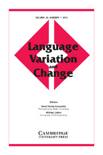
Language Variation and Change
metrics 2024
Exploring the Dynamics of Linguistic Diversity
Introduction
Welcome to Language Variation and Change, a prestigious journal published by Cambridge University Press and dedicated to the rigorous exploration of linguistic diversity and its evolution. With an ISSN of 0954-3945 and an E-ISSN of 1469-8021, this journal has been a pivotal platform for scholars since its inception in 1989, continuing to publish cutting-edge research up to 2024. Language Variation and Change is recognized in the top quartile for Linguistics and Language (Q1) and holds an impressive Q2 ranking in Education for 2023, underscoring its significant contribution to these fields. Its strong Scopus rankings—placing it in the 86th percentile for Arts and Humanities in Language and Linguistics—highlight its impact and quality. This journal aims to foster a deeper understanding of the dynamic interplay between language and society, making it essential reading for researchers, professionals, and students eager to engage with the latest findings and theoretical discussions in the arena of sociolinguistics. Stay connected with the evolving landscape of language studies through Language Variation and Change.
Metrics 2024
 0.66
0.66 1.40
1.40 1.80
1.80 56
56Metrics History
Rank 2024
Scopus
IF (Web Of Science)
JCI (Web Of Science)
Quartile History
Similar Journals

Language and Linguistics Compass
Connecting Scholars Across the Globe in Language ResearchLanguage and Linguistics Compass, published by Wiley, stands as a premier journal in the field of linguistics, showcasing innovative and interdisciplinary research. With its ISSN 1749-818X and E-ISSN matching, the journal has built a robust reputation, achieving an impressive Q1 ranking within the linguistics category for 2023, placing it in the top 4% of its field. Its Scopus rank of 48 out of 1167 highlights its influence and significance among linguistics journals, boasting a commendable 95th percentile. This journal serves as a vital resource for researchers, professionals, and students, offering a wide range of accessible articles that illuminate current trends and advances within the domain of language studies. Although it is not Open Access, the journal is committed to quality and diversity in its publications, ensuring scholarly articles from various sub-disciplines of linguistics are represented from 2008 through 2024. Located in the United Kingdom, Language and Linguistics Compass invites contributions from around the globe, reinforcing its status as a leading forum for linguistic discourse.
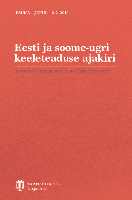
Eesti ja Soome-Ugri Keeleteaduse Ajakiri-Journal of Estonian and Finno-Ugric Linguistics
Advancing the Understanding of Finno-Ugric LinguisticsEesti ja Soome-Ugri Keeleteaduse Ajakiri - Journal of Estonian and Finno-Ugric Linguistics is a premier academic journal published by UNIV TARTU PRESS, dedicated to advancing the field of linguistics with a particular focus on the Estonian and Finno-Ugric languages. Since its inception, the journal has embraced an Open Access publishing model, allowing researchers and enthusiasts to freely explore its groundbreaking studies and findings since 2013. With an Impact Factor that places it in the Q3 quartile of leading journals within the linguistic domain, it serves as a vital platform for the dissemination of new research and theoretical advancements. Ranked 410th out of 1088 journals in the Arts and Humanities category for Language and Linguistics, it reflects a robust commitment to quality scholarship that appeals to academics, professionals, and students alike. Operating from Tartu, Estonia, the journal aims to foster greater understanding and appreciation of the Estonian language within the broader context of Finno-Ugric studies, making it an essential resource for anyone interested in these unique linguistic cultures.

Verba-Anuario Galego de Filoloxia
Nurturing Language Studies for Tomorrow's ScholarsVerba-Anuario Galego de Filoloxia is a prominent academic journal published by UNIV SANTIAGO COMPOSTELA, dedicated to advancing the field of linguistics and language studies. Hailing from Spain, this journal provides a vital platform for researchers, educators, and students interested in Galician philology and its broader linguistic implications. Although it operates under traditional access models, the journal’s commitment to quality research is reflected in its categorization within Q3 in Linguistics and Language for 2023, showcasing its significant contributions to the field. Encompassing a convergence period from 2017 to 2024, Verba garners attention in both the Arts and Humanities and Social Sciences domains, with its Scopus rankings highlighting its moderate impact within these categories. By nurturing scholarly dialogue and disseminating innovative studies, Verba-Anuario Galego de Filoloxia plays a crucial role in promoting linguistic research, making it an essential resource for professionals and academic institutions striving to explore the complexities of language and philology.

Annual Review of Linguistics
Advancing Linguistic Insights for a Deeper UnderstandingAnnual Review of Linguistics is a premier scholarly journal dedicated to advancing the field of linguistics through comprehensive and insightful reviews of current research and emerging trends. Published by ANNUAL REVIEWS, this journal is recognized for its high impact, evidenced by its Q1 ranking in the Linguistics and Language category and exceptional placements in the Scopus Ranks, positioning it in the top 2% of its field. Since its inception in 2015, the journal has served as a vital resource for researchers, professionals, and students seeking to deepen their understanding of language theories, acquisition, processing, and sociolinguistics. With no Open Access currently available, the Annual Review of Linguistics is esteemed for its rigorous peer-reviewed articles that synthesize a wealth of knowledge, making it an indispensable tool for advancing research and dialogue within the linguistic community.
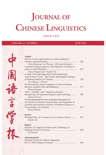
JOURNAL OF CHINESE LINGUISTICS
Exploring Linguistic Diversity Through a Chinese LensJOURNAL OF CHINESE LINGUISTICS, published by the JOURNAL CHINESE LINGUISTICS, is a prominent periodical that serves as a vital resource for researchers and scholars in the fields of linguistics and Chinese studies. With its ISSN 0091-3723, this journal has been contributing to the academic community since 1996 and continues to publish innovative research until 2024. Although it is classified in the third quartile (Q3) for both Arts and Humanities and Linguistics categories, its focus on Chinese linguistics positions it uniquely within this specialized domain. The journal is committed to advancing the understanding of Chinese language structures, usage, and context, encouraging interdisciplinary dialogue among linguists and language researchers. While currently not labeled as open access, the journal remains accessible to institutions and scholars worldwide, creating an invaluable platform for disseminating knowledge. As such, it plays a critical role in promoting linguistic diversity and cultural awareness within the academic landscape.

Estudios de Linguistica-Universidad de Alicante-ELUA
Unlocking the Future of Linguistics Through Open AccessEstudios de Linguistica-Universidad de Alicante-ELUA is a distinguished academic journal dedicated to advancing the field of linguistics, published by Universidad de Alicante. With an Open Access model adopted since 2020, ELUA facilitates greater accessibility to pioneering research for scholars and enthusiasts alike. The journal's ISSN is 0212-7636 and its E-ISSN is 2171-6692, ensuring it is indexed and easily discoverable in academic databases. Though the journal's H-Index is currently not specified, its commitment to disseminating high-quality linguistics research positions it as a valuable resource for researchers, professionals, and students. The journal aims to foster scholarly dialogue and innovation in various linguistic domains, making it an essential platform for sharing insights and findings that shape contemporary linguistic studies. Based in Alicante, Spain, ELUA is poised to contribute significantly to the global linguistics landscape.

Glossa-A Journal of General Linguistics
Advancing Open Access in Language ResearchGlossa: A Journal of General Linguistics, published by the Open Library of Humanities, stands as a leading voice in the realm of linguistic research since its inception in 2016. With its Q1 category ranking in Linguistics and Language and impressive Scopus ranks encompassing the top 83rd and 81st percentiles in its respective fields, Glossa fosters a vibrant academic community committed to the rigorous exploration of language and linguistic theory. Operating under an open access model, the journal not only enhances the visibility of groundbreaking research but also ensures that valuable insights are accessible to a global audience. The journal's commitment to interdisciplinary dialogue makes it an indispensable resource for scholars, professionals, and students eager to engage with contemporary developments in linguistics. As it converges into 2024, Glossa continues to champion innovative scholarship and critical discourse that challenges conventional boundaries within the field.
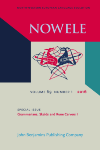
NOWELE-North-Western European Language Evolution
Advancing Knowledge in North-Western European LinguisticsNOWELE-North-Western European Language Evolution, published by John Benjamins Publishing Co, serves as a vital platform for researchers and scholars interested in the evolution and dynamics of North-Western European languages. With an ISSN of 0108-8416 and an E-ISSN of 2212-9715, this journal has been contributing to the field of linguistics since its inception in 1983, with ongoing publications until 2024. Indexed in Scopus and classified in the Q3 category for Linguistics and Language, NOWELE is recognized for its rigorous academic standards and diverse contributions, ranking #485 out of 1088 in the Arts and Humanities category, and #566 out of 1167 in Social Sciences. The journal fosters an open dialogue within the linguistic community, presenting innovative research findings and theoretical advancements. Researchers, professionals, and students alike benefit from its systematic exploration of language evolution in the context of a rapidly changing global linguistic landscape.
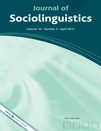
JOURNAL OF SOCIOLINGUISTICS
Charting New Territories in Language Variation and ChangeThe Journal of Sociolinguistics, published by Wiley in the United Kingdom, is a leading interdisciplinary journal that explores the intricate relationships between language and society. With an impressive impact factor reflecting its Q1 quartile ranking in Histories and Philosophy of Science, Linguistics, Philosophy, and Sociology, this journal is recognized for its scholarly contributions, making it a vital resource for academics and practitioners in these dynamic fields. Covering a wide scope of topics from language variation and change to sociocultural dynamics, the journal has converged from 2004 to 2024, ensuring a comprehensive understanding of contemporary sociolinguistic issues. Although operating under a traditional access model, the Journal of Sociolinguistics remains pivotal for advancing critical dialogue and research for professionals, researchers, and students invested in linguistic and sociological studies.
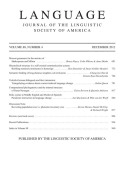
LANGUAGE
Illuminating the Complexities of Human CommunicationLANGUAGE, published by the Linguistic Society of America, is a premier academic journal dedicated to the rigorous study of linguistic theory and practice. With an ISSN of 0097-8507 and E-ISSN 1535-0665, this esteemed journal has established itself as a leading publication in the field of linguistics since its inception. The journal has consistently maintained a high impact factor, being ranked in the Q1 category in Linguistics and Language for 2023, placing it among the top tier of academic journals. Notably, it also holds impressive Scopus rankings, being positioned at #75 out of 1088 in Arts and Humanities, and #89 out of 1167 in Social Sciences, demonstrating a significant impact and reach in the discipline. While it is not an open-access journal, LANGUAGE provides crucial insights into linguistic research, fostering a vibrant academic community. Spanning years from 1996 to 2024, it continues to be an essential resource for researchers, professionals, and students alike, aiming to advance the understanding of language in its myriad forms and functions.